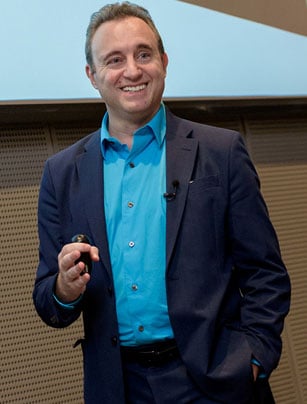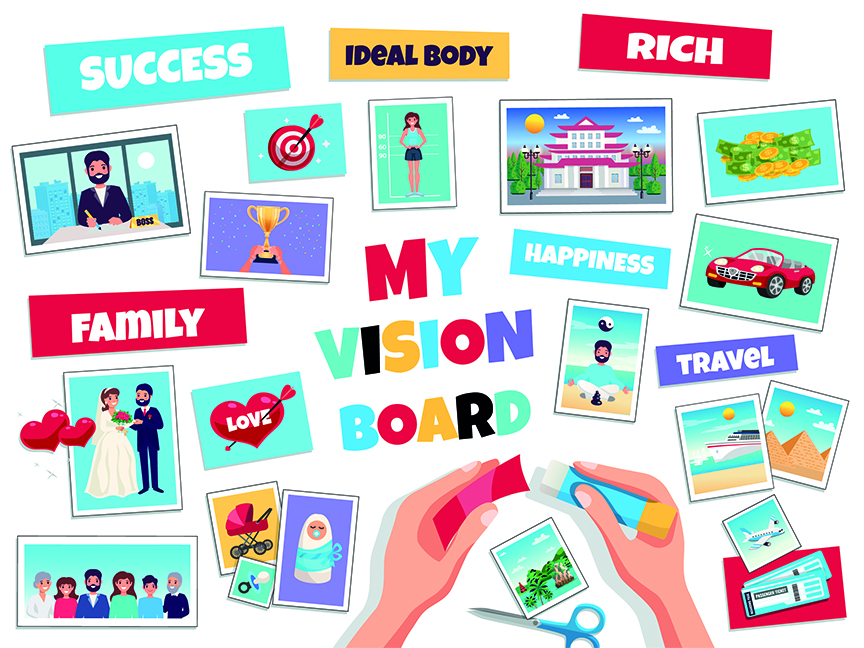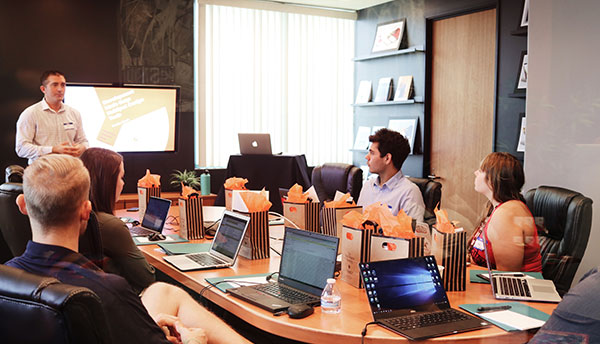Do you want a more compelling future? To set a goal and have realistic dreams you feel are moving you towards making measurable progress so you too can achieve your goals and have a powerful success strategy so you can have more time, more energy, better relationships and more money.
Today I'm going to list three real tips so you too can achieve and live a compelling future.

Those four elements make up what we call a Freedom Lifestyle.
It's like looking in a mirror. Review and get clear on your purpose, the inspiring story about what your future is… what I call your pot of gold at the end of the rainbow.
Ask questions like:

Use a worksheet to answer these questions.
When you're having the impact that you really want to have, when you're making a difference in people's lives. What is that you're getting up for everyday and you're doing that you are enjoying with the people that you really want to do it with?
You've got to paint that picture and decide to get very clear on it.
With my $50,000 high-end coaching clients, one of the things that I talk about all the time is The Entrepreneurial Yellow Brick Road which has four milestones on it.
The first milestone is when you make your first dollar online.
The second milestone is when you make your first $10,000 online.
The third milestone is when you make your first $100,000 online.
The fourth milestone is when you make your first million dollars online.
Decide where you are and where you want to be on that on that yellow brick road.
Have you made your first dollar online?
Have you made your first $10,000?
Have you made your first $100,000?
Have you made your first million?
OR are you on your way to those?
How many months will it take to reach your next milestone?
Get very clear on what is your compelling future.
Relax, listen to music, get quiet and get clarity on your objectives and what individual situation or context or subconscious block is in your way.
What's holding you back?
What's keeping you stuck?
What are the roadblocks?

Check the barriers you can't seem to break through, no matter what you've tried before.
Now we're addressing the three gaps you can have when it comes to setting and reaching your goal or goals and making daily progress:
Guess which one most people have?
Most people have a Belief Gap.
It's the belief, "I probably can't do it anyway. I'm not smart enough, it sounds too hard, I don't have the crucial motivation, I don't know the right actions to take, there are too many obstacles, I'll never lose the weight, I'll never lose the pounds, I'll never be rich, I'll never have the body I want, it's too difficult, I can't imagine hitting my goal, I simply don't have the commitment to reach my goals, so why bother? It's easier to just stay in bed or go to the stores or the museum.”

Remember, that very thought will keep you STUCK.
Most of the people I've coached over the last two decades came to me with a Belief Gap that was keeping them STUCK.
Make it more about meaning than money.
In my experience, we human beings will do more for MEANING than for money.
For example, when you go on social media, you see all the gurus in front of their Lambos and private jets, showing off all their "cool stuff" and saying "Hey man, aren't I awesome? I made all this money and I'll show you how to do it too!”
They're great self-promoters, but what I've noticed after spending half a million dollars with all the gurus out there, is that they can't teach their way out of a paper bag!
Isn't it interesting that of course we want money and all the nice things money can buy.

But really our goal is the four elements of a Freedom Lifestyle I just talked about:
- Our goal is MORE TIME. Meaning we set goals are BE FREE, to feel happy and fulfilled, to produce the fearless, unique measure of achievement we desire, adopting our own schedule - whether we want to enjoy coffee in the morning, time to be grateful, time to photograph a beautiful scene, time to pursue dreaming without a specific timeline.
- Our goal is MORE ENERGY. Meaning we set goals precisely because defining our lives by money means short outcomes that don't satisfy. We want to have the peak performance that leaders do, stop the rush of life, come from the heart, stop being so tense and telling ourselves things that aren't true, pursue healthy initiatives for the long term, get in touch with Source and the healthy voice in our hearts.
- Our goal is BETTER RELATIONSHIPS. Meaning we set goals are so we may have the optimal management of our enterprises, taking actionable development, avoiding foolish, incomplete or ambiguous goals, getting input and ideas and topics from the right people and trusted consultants and our company's culture working uniquely in concert, giving and receiving proper evaluation, enjoying the people that we're with. And of course ...
- Our goal is MORE MONEY. Meaning we set goals for inspiration, for our school and communities, to provide super learning no matter the type or format, to save for our future and for our company's forward movement, no matter the current times or history.
Yes, it is attainable.
Yet no matter the industry - whether food and beverage, health, network marketing, entrepreneurial, service industry, even if you're an educator - what I've seen over the last two decades of coaching people in dozens of industries that money is NOT the best motivator for most of the clients I work with.
Most people will do more to make a difference.
Now I do want to show you something here about how you can make money from me so that you can fulfill your mission and create a more compelling future.
I'm going to show you my screen in the video and it's actually very simple.
You can make a difference and also make money by being one of our Success Clinic Ambassadors.
An ambassador is our version of an affiliate program. You're probably familiar with affiliate marketing where you promote other people's products and courses.
I started SuccessClinic.com in my college dorm room with $800 to my name and a book on html.
Since that time, I've made millions and millions of dollars and I've helped my clients make billions of dollars.
We are a referral-driven organization.
That means we are ready, willing and passionately able to help anyone and everyone that you send to us or that you refer to us.
What that means for YOU is that we are going to take great care of everyone that you send to us.
To get started, simply go to https://NoahStJohn.com/jv
Sign up by entering your name, email and your Paypal Email so that I can pay you via PayPal whenever someone signs up for one of my programs through your Ambassador link.
Many people around the world tell me every day that my programs have changed their lives.
This is how you can make money and know that you're making a great difference.
At the time of this recording, what we are promoting this month is called the Power Habits® 21-Day Challenge and you can find more information about that at https://PowerHabitsChallenge.com
That's where you can sign up, because I will show you how to have better mind HEALTH and more business WEALTH in the next 21 days.
To promote any of my products, once you are logged in to your account on noahstjohn.com/jv you will see blue buttons there to take you to the page with your affiliate links, swipe copy for email and images you can actually use to promote it on Social Media or on your blog.
With the swipe copy you can just literally copy and paste to your email, replace the link with your affiliate link and you are good to go.
You can also promote the Afformations System anytime you want that’s at
Creating a compelling future means you are setting goals, making measurable progress every step of the way, following fundamental proven leadership and organizational principles like the ones taught at Harvard and other institutions, serving others, and feeling the momentum that comes from following effective motivational workshop goals like these.
Start to follow the systems so you can have MORE TIME to achieve the goal or goals you set...
MORE ENERGY to transform your life...
BETTER RELATIONSHIPS so you have the deep community of people who love you, and...
MORE MONEY so that you can achieve your out sized goals in a week that you haven't been able to do in months or even years.
Write a new narrative for yourself, give this the attention it deserves so you too can create a compelling future for you, for your business, for your career, for your family and for your legacy.
Working from home can be a double-edged sword. On one hand, you get to ditch the commute and work in your pajamas. On the other hand, the distractions at home can be relentless.
If you’re struggling to stay productive while working from home, you’re not alone. But don’t worry—I’ve got five killer tips to help you maximize your productivity and keep distractions at bay.
When you’re working from home, it’s easy to fall into the trap of being “on” all the time. No one’s watching you clock in or out, and that flexibility can quickly turn into chaos. To avoid this, create a schedule that mimics a traditional workday. Start by setting specific work hours and stick to them. This will help you get into a routine and make it easier to focus on your tasks.

One of the biggest challenges of working from home is dealing with interruptions. Whether it’s your spouse, kids, or pets, distractions can derail your productivity in no time.

Establish a dedicated workspace and make it clear to everyone in your household that during work hours, you’re not to be disturbed unless it’s an emergency. A simple, “I need to focus for the next few hours, so please avoid interruptions unless absolutely necessary” can work wonders.
Here’s a productivity hack that’s a game-changer: NMUI, which stands for Ninety-Minute Uninterrupted Intervals. Studies show that humans can maintain peak focus for about 90 minutes at a time before their attention starts to wane.

Use this to your advantage by working in focused bursts of 90 minutes, then taking a break. During your break, stretch, grab a snack, or have a quick chat with a family member. This rhythm keeps your energy high and your productivity soaring.
Your workspace should be a haven of comfort and functionality. Invest in ergonomic office furniture, like a comfortable chair and a good desk, to avoid physical strain.

A quality keyboard and mouse can also make a big difference. If you’re using a standing desk, make sure you have comfortable shoes to support you throughout the day. Additionally, a large computer screen can reduce eye strain and make your work more efficient.
One of the downsides of working from home is the blurring of boundaries between work and personal life. It’s crucial to have a clear end to your workday. When you finish work, shut down your computer, turn off work notifications, and step away from your workspace.

This helps you disconnect and ensures you have time to relax and recharge. Remember, productivity isn’t about working 24/7—it’s about working smart and enjoying a balanced life.
Just because you’re working from home doesn’t mean you should skip your morning routine. Start your day with activities that prepare you mentally and physically for work. Whether it’s a workout, meditation, or a healthy breakfast, having a consistent morning routine sets a positive tone for the rest of the day.
A well-organized workspace can make a huge difference in your productivity. Keep your desk tidy and ensure all necessary supplies are within reach. Personalize your space with items that inspire and motivate you, but avoid clutter that can distract you. Consider adding a plant or artwork to make your workspace more inviting.
Leverage technology to boost your productivity. Use apps and tools designed for remote work, such as project management software, time-tracking apps, and communication platforms. However, be mindful of technology overload—limit your use of social media and avoid getting sidetracked by non-work-related apps.
When working remotely, it’s easy to feel isolated. Stay connected with your colleagues through regular virtual meetings, emails, and instant messaging. Open communication helps maintain team cohesion and ensures everyone is on the same page. It also provides a sense of camaraderie and support.
Setting clear, achievable goals helps maintain focus and motivation. Break down larger projects into smaller tasks and track your progress. Use tools like to-do lists or project management apps to monitor your achievements and stay organized. Celebrating small wins can boost your morale and keep you motivated.
Identify common distractions and find ways to manage them. For example, if you find yourself checking your phone frequently, consider placing it out of reach during work hours. Use website blockers to limit access to distracting sites and create a work-friendly environment.
Continuous learning and skill development can enhance your productivity and job satisfaction. Look for online courses, webinars, or workshops that align with your professional goals. Investing in your growth not only improves your skills but also keeps you engaged and motivated.
Maintaining your physical and mental well-being is crucial for sustained productivity. Incorporate self-care practices into your routine, such as regular exercise, healthy eating, and adequate sleep. Taking care of yourself helps you stay energized and focused throughout the workday.
Regularly seek feedback from colleagues or supervisors to understand how you’re performing and where you can improve. Be open to constructive criticism and make adjustments as needed. Flexibility and a willingness to adapt can enhance your productivity and effectiveness.
Balancing work and personal life is essential for long-term productivity and well-being. Set clear boundaries between work and home life, and make time for activities that you enjoy outside of work. Prioritizing work-life balance prevents burnout and helps you maintain a positive outlook.
Working from home offers incredible flexibility, but it also presents unique challenges. By creating a structured schedule, setting firm boundaries, using productivity techniques like NMUI, investing in quality office equipment, and clearly defining the end of your workday, you can supercharge your productivity and maintain a healthy work-life balance. These strategies will help you stay focused, reduce stress, and make working from home a more enjoyable experience.
How do I stick to a work-from-home schedule?
Consistency is key. Set clear working hours, create a daily routine, and use tools like calendars or task management apps to keep you on track.
What if my family keeps interrupting me while I work?
Communicate clearly with your family about your work hours and the importance of minimizing interruptions. Consider using noise-canceling headphones to reduce background noise and signal to others when you’re in work mode.
How often should I take breaks during work?
Following the NMUI method, take a break every 90 minutes. Use this time to stretch, move around, or grab a snack. Regular breaks help maintain focus and prevent burnout.
What are the best ergonomic investments for a home office?
Invest in a good chair with lumbar support, an adjustable desk, a quality keyboard and mouse, and a large monitor. Ergonomic accessories reduce strain and improve comfort during long work sessions.
How can I ensure I stop working at the end of the day?
Set a clear end time for your workday and stick to it. Develop a ritual that signals the end of work, such as shutting down your computer or turning off work notifications. This helps create a boundary between work and personal time.
Would you like to learn how to be confident and how to have more confidence? Here are my Top 10 Tips on how to be confident, how to be confident in yourself, how to be confident speaking, how to be confident as a woman, and much more.
The word confidence comes from the Latin word confidere which means "with trust."
Confidence means that you trust yourself.
If you don't feel confident in yourself, if you lack confidence, that means you don't trust yourself. And if you don't start to trust yourself, how can other people feel they can start to trust you?
The good news is, you CAN start trusting yourself and build confidence in any social setting. It might feel like a big change, but it just takes practice, time, staying positive and taking action.
Confidence starts in the mind.
The feeling of confidence comes from trust -- trust in yourself and feeling comfortable in your own skin.
For instance, most people focus on things like money, growing their network, trying to get a date or be happy.
Yet all of those outcomes come from trust.
Whether you're a parent and you want your kid to clean their room, or you want to persuade a contact to buy from you, you've got to boost trust.
Whether you're a coach, a consultant, an entrepreneur… you've got to build trust.
Why else do you want to confidence? Because it helps you break free from self-doubt. Whatever we're doing in life, we have to persuade people to our way of thinking. You can't do that if you're not confident.
Think of the best leaders, the best communicators you know. How many of them lack confidence? I bet that that number is zero.
Every great speaker, every great communicator, every great business leader or coach or consultant or parent is confident.
Now that doesn't mean that person is right every time, because no one's right all the time.
Yet you can be confident enough to say “I was wrong."
Because it takes confidence to say I was wrong.
Think about the times when you did a great job remember those past victories.

Let's say you've lost your confidence with all the stuff that's going out there in the world right now.
Remember your past victories, feel the feeling of when you did things RIGHT -- that conversation when you landed that sale, when your self esteem was sky-high, when you felt the power from within you, when your brain was firing on all cylinders, when you got the date, and so on.
Close your eyes and feel the feeling of achievement, because that memory and that feeling will help you achieve more today and overcome any fear.
I’ve written 15 books on the subject of taking out your head trash and the principles and beliefs of how to succeed.
When you look at how to be confident in yourself, one thing you can do right now is go to https://SendMeaBookNoah.com and grab a copy of my new book Get Rid of Your Head Trash About Money FREE (just cover shipping).
Take out that head trash and remember what your head trash is really costing you -- which can be a lot.

When we look at how to be confident speaking, whether it's virtually or live -- remember to smile.
Why? Because when you smile, you feel better.
Of course, there's no question that you don't want to use a fake smile, because everyone can see the difference between a fake smile and a real smile.
What if you don't feel like smiling?
Simple: Smile anyway. Put an image in your mind that makes you smile.
Even if it's weird, like a compliment you got from someone you love!

What does someone who has confidence look like?
They have good posture, their shoulders back, they look people in the eye, they don't slouch.
Is it really that simple?
Yes, it is.
Many people think the mind leads the body. However, in many cases, the body leads the mind.
So one important plan of how to be confident at work is to use good posture and don't feel trapped by past behaviors or get stuck in a rut.
and
If you find yourself afraid of taking risks, I like the remember these two quotes:
Everything You Desire Is On The Other Side of Fear
and
Do Something That Scares You Every Day
For example, in 2007 I was $40,000 in credit card debt, working out of my parents basement.
I’d been in business for 10 years and yet I had made so many mistakes and failures. I listened to all the wrong people got tons of bad advice and I ended up in a very bad place.
I realized those two things that I just shared with you:
#1 Everything you desire is on the other side of fear; and
#2 Do something that scares you every day.
The thing I was most afraid of was hiring a business coach. Because I'd made so many mistakes before.
But I realized that many of the mistakes I'd made came from listening to the wrong people - not the people who had the experience, the efficacy, the life experience I needed to grow.
So I took that step of faith -- I hired a business coach and it was the best decision I ever made!
I went on to hit six and then seven figures in my business, because I finally had a system and somebody who helped me get where I wanted to go.

I put these 3 tips together for how to be confident as a woman, because many of my female coaching clients came to me because they felt they had to learn how to talk well about themselves. They thought it was hard to accept compliments because they'd had trouble with it in the past.
Say what you mean -- Don't apologize for speaking your mind.
Learn how to accept compliments - Whether from a client, a friend, or your partner, accept when people talk well about you.
Ask for what you want - Because who knows? You might get it!
Use these simple yet powerful tips and plan to improve your confidence so you too can learn how to be more confident in yourself, more confident at work, and how to be confident again!
Facing the Giants Death Crawl scene has become very popular. People have shared and watched this movie hundreds of thousands of times.
From Wikipedia:
Facing the Giants is a 2006 American Christian drama sports film directed by and starring Alex Kendrick. The supporting cast was composed of volunteers from Sherwood Baptist Church, and it is the second film that Sherwood Pictures has done. Shot in Albany, Georgia, the film relates an underdog story about American football from a Christian worldview. The film made $10.2 million on a $100,000 budget.

The plot:
In 2003, Grant Taylor (Alex Kendrick) is the head football coach at Shiloh Christian Academy, and has yet to post a winning record in his six-year tenure. After his seventh season begins with a three-game losing streak, the players' fathers begin to agitate for his firing. This is not the only problem Grant is facing; his home has a leaking roof, his appliances are breaking down, and his car is an unreliable embarrassment. Then, he learns that he is the reason that his wife Brooke cannot become pregnant.
Suffering intense emotional turmoil, Grant stays up all night praying and studying scripture. Finally he is inspired by his old football coach to create a new coaching philosophy and decides to praise God regardless of on-field results. At the same time he influences his players to give far greater effort and tells them that they can win under God's guidance. The improved attitudes of his players influence the rest of the school. From that point on, the Eagles win all their remaining regular season games and qualify for the state playoffs.
--
In the Facing the Giants Death Crawl scene, Grant Taylor (played by Alex Kendrick) the head football coach, pushes Jeremy Brock (played by Jason McLeod), the team captain, further than Brock would ever have pushed himself.

In this movie drama (which has no conventional Hollywood stars), the coach tells Brock (McLeod) not to quit. He told him that God had big plans for him.
But he didn't just tell him.
He gave his player the opportunity to get a moving life lesson he'll never forget on how to overcome his fear, how to have faith in himself and faith in God, to find strength he never thought he had, and to find inspiration -- even as he was crawling on his knees across a football field.
As he is driving down the field with the season on the line, the yards are piling up. Yet the steps are getting harder and harder.
Watch the scene to see the coach do something monumentally clever.
The coach blindfolded Brock to see where his heart is.
Why?
Because he didn’t want Brock to give up before he gave it his “very best.”
Watch Facing the Giants Death Crawl scene here…
How would you feel if you had to carry a 140-pound man the length of a football field?
Imagine how Brock felt.
Would you feel the weight of your school, your ministry, your family?
What would your mind say to you in those moments?
What would your motivation be?
--
Interesting trivia about this video (from Wikipedia): The football action sequences were shot by the film's director of photography, Bob Scott, a veteran cinematographer for NFL Films. Another NFL Films technician, Rob Whitehurst, recorded the movie's sound.
Want to know how to believe in yourself?
This article will focus on ideas of how to believe in yourself from across the web.
If you want that feeling of progress, looking for activities, opportunities, or even a specific exercise to progress or maintain alignment, there's no question that focusing on these daily checkpoints will help you start thinking, speaking and acting in ways to help you overcome negativity and that difficult voice of self doubt.
This means you can feel more confident, defeat fear, manifest your goals faster and have that breakthrough you’re capable of!
When we feel confident, act and take small steps, we start to build momentum. We feel intuitively that once we start moving, our momentum makes it easier to keep going forward and overcome our fears. This is why it is so important to take action toward our goal, no matter how seemingly small. Much like a rocket launch that uses the most fuel in the first stage, once you start moving, your propulsion becomes easier to accomplish your goal. (skilledatlife.com)
If you feel you can't handle stress , you'll be less likely to step outside your comfort zone. Then, because you never practice doing anything scary, you'll struggle to handle discomfort when it arises. (psychologytoday.com)
The most successful people have failed more times than most people even try. There are some cases where failure can result in death (e.g., botching a life-saving surgical operation), but when it comes to trying something new, the stakes aren't usually that high. The danger is mostly to your ego, but that can recover. (liveboldandbloom.com)
There's no question that making the choice to believe in yourself is an important beginning. After all, you can't get anywhere without it. The impacts of believing in yourself are immediate, but require continuous effort because old habits die hard. If you've been living with doubt and insecurity for years, it may take a while to learn how to believe in yourself completely. So stay vigilant as these negative thoughts will try to creep back in if you're not careful. (cosmoctopus.com)

If you have positive values, such as love, care, compassion, health and generosity, you will believe that people in your world are deserving of these values and you will treat them accordingly. When you believe in yourself and chose to be a good person you will find yourself to be more positive and successful in life. (briantracy.com)
Your beliefs, rather than your lack of ability, could be the biggest hurdle standing between the life you're living and the life you want to live. But the good news is that with a little time and extra effort, you can develop the mental strength needed to overcome the self-limiting beliefs that prevent you from reaching your greatest potential. (psychologytoday.com)
When you begin living true to your identity and core values, you will start believing in your worth, your abilities, and your human potential. (soulsalt.com)
In each moment you are born again free from the many mistakes and failures of the past, and free from their heavy burden. And when you choose to create your life from the present moment, you are in fact choosing to create your life from a place of infinite choices and possibilities. And no longer from a place of fear and limitations. (purposefairy.com)

The biggest difference I've noticed between successful people and unsuccessful people isn't intelligence or opportunity or resources. It's the belief that they can make their goals happen. (jamesclear.com)
The key is to be true to yourself, to be true to the very best that is in you, and to live your life consistent with your highest values and aspirations. This is the only way to truly learn how to believe in yourself. (briantracy.com)
Most people start off with little or low self-confidence, but as a result of their own efforts, they become bold and brave and outgoing. And we've discovered that if you do the same things that other self-confident men and women do, you, too, will experience the same feelings and get the same results. (briantracy.com)
While I think that self-belief comes naturally to children, as we grow older we're taught to be embarrassed for our mistakes, that we need to be or act a certain way to fit in, and that our body, age, weight, hair color, teeth, skin color, eye shape, or even shoe size is not good enough. With all these messages bombarding us, no wonder we lack confidence. (cosmoctopus.com)
The biggest difference I've noticed between successful people and unsuccessful people isn't intelligence or opportunity or resources. It's the belief that they can make their goals happen. (jamesclear.com)
Moreover, resistance can either be internal or external. The tips above are crucial in getting rid of resistance that blocks you from moving forward or causes you to quit. E.g., limiting stories, physical exhaustion, negative people, etc. But regardless of where it is coming from, you need to break through the resistance in order to manifest your greatest desires. (lifehack.org)
If you've spent 30 years believing you're a loser, then simply telling yourself, "I'm a winner," isn't likely to be helpful. You can't unlearn deep-rooted core beliefs that easily. Instead, you have to challenge your beliefs by testing them to see if they're really true. (psychologytoday.com)
Whenever you discover evidence to the contrary like you ace a test or land a promotion you chalk it up to external factors, like luck. You ignore your accomplishments and magnify your mistakes. That's just how your brain works when you so wholeheartedly believe something. (psychologytoday.com)
In fact, the mind is such a powerful instrument; it can deliver literally everything you want through the power of positive expectation. (jackcanfield.com)
Ask the people closest to you to tell you about your positive traits, talents and skills. Since we tend to be extremely critical of ourselves, get positive feedback from others who are better able to see your virtues. You may be surprised by what you hear and may learn that you have more going on for you than you realized. Positive reinforcement from others can be very powerful and empowering. The more regularly you do this, the bigger an impact is has on your self-confidence and belief. (skilledatlife.com)
Practice: Set a 2-5 minutes timer as soon as you wake up and before going to bed everyday. Stand in front of the mirror and simply begin to talk to yourself with positive words counteracting your self-doubts. (mayooshin.com)

Just as we should surround ourselves with positive people who strengthen our self-confidence, we should avoid ones that do the opposite. Rid yourself of toxic friends, or at least limit the time you spend with them. Misery loves company so stay away from it. (skilledatlife.com)
By setting tight boundaries in the relationship and reducing the time spent with them, you stand a much better chance of achieving your goals and inspiring them to become a better person in the process. (mayooshin.com)
Success is really the accumulation of smaller successes. By consistently and repeatedly performing certain tasks, we work our way towards our eventual goal. Along the way, we build momentum and build confidence. It is an extremely effective way to change our lives for the better. While our distant goals can sometimes seem too lofty and beyond our reach, when we complete small actions consistently, we know that we are like a car driving cross country, with the first mile counting as much as the last one. (skilledatlife.com)
Your mind can be your best asset or your biggest enemy. If you've drawn inaccurate conclusions about yourself, your self-limiting beliefs could prevent you from reaching your greatest potential. (psychologytoday.com)
Pick one habit you would like to change or adopt and start today. You could start flossing your teeth twice a day, eating a piece of fruit in the morning, sleeping and waking up early, reading 25 pages of a book each day, watching less TV, etc. Small changes lead to big changes. More importantly, when you change or adopt a good habit, your self-confidence grows because you learn that you have what it takes to take positive action. (skilledatlife.com)
You'll want to do this several times over weeks, or even months. Each time you'll get closer to uncovering your core values . (soulsalt.com)
Let go of what happened in the past any guilt, shame , blame, and resentments you might be holding on to. And allow yourself to move forward in life, without that heavy burden of the past on your shoulders. (purposefairy.com)
Amazingly, there's been recent research on how loving-kindness and compassion affect the brain. There was one study when people with no training were taught by compassion meditation by Tibetan monks. In only two weeks, there were noticeable changes in the participants on fMRI scans. This goes to show that, people can develop skills that promote happiness and compassion. (cosmoctopus.com)
Similarly, let's say that you want to have a better, healthier body. If you are not mentally and emotionally prepared to put in the amount of work and effort required to achieve your desired outcome, you won't realize it. Make a list. (lifehack.org)
Doing things that scare you will solidify the confidence you need to be your truest self. It sounds counter-intuitive, but being vulnerable accepting your fear and not hiding it is the surest path to building strength. (soulsalt.com)
If you don't believe in yourself, you won't believe someone who is cheering you on from the sidelines. That's why a great small business coach leads their clients to success not by cheerleading, but by developing talent. (soulsalt.com)
One of the most effective ways to establish a success mindset is to act as if you are already the kind of person who has created the ideal life you want to live. (jackcanfield.com)
Learning how to believe in yourself requires a holistic strategy. You must take control of your thoughts and feelings so you're able to reach your peak state 1. Realize it starts with you Believing in yourself is all about finding your inner reservoir of strength and resiliency but how? To get in touch with your personal power, you need to adopt new routines. Consider building a meditation practice into your routine. (tonyrobbins.com)
Keep your vibration high and clear resistance, too that's the next step in understanding how to manifest what you want in your life. Manifestation is a process that can take time and effort. If you don't protect your vibration and clear resistance along the way, it'll be a tough ask of yourself. (lifehack.org)
In fact, it's much easier for us to remember negative experiences than positive ones. That's largely to do with survival it pays to remember where the lions live so you can avoid them. Unfortunately for us modern-day humans, that largely translates into remembering fights, traffic, and rude sales associates. We get stuck on these negative experiences and forget the good ones. (cosmoctopus.com)

One way to do this is with a motivational vision board . A vision board is a graphic representation of exactly what you want in life. You look at it every day. Use it to visualize exactly where you want to go. (jackcanfield.com)
Building identity capital means doing things that add value to who you are. Start investing time and effort in becoming that someone you want to be. (soulsalt.com)
Key Topics: manifestation process, desired outcome, greatest desires, clear resistance, Courage, Lifehack, hard work, road trip, real life, Life Coach
Outline:
Key Topics: Success, rah-rah, New York, red flag, small hope, baby steps, loved ones, PianoVerse, art school, Melissa ng
Outline:
This article included the following sources:
These are some relevant questions found across sources:
These are some factual sentences found across sources:
Are you working from home right now? A lot of people right now are working from home who are not used to it.
So, what are some do's and don'ts when you are working from home?
DO: Have a dedicated work space.
DON’T: Work from bed.
DO: Take frequent breaks.
DON'T: Work all hours of the day and night.
DO: Work in focused bursts.
DON’T: Get distracted by social media.

You want to make sure you have a dedicated work space because you're not going into the office right now.
For example, I've proudly had a "work from home" home office for more than two decades.
I started my company in my college dorm room in 1997 with $800 and a book on HTML.
Today, we have a multi million-dollar business and I still work from home and I have a virtual team that's literally around the world.
If you are working from home right now, you need a dedicated work space just like you're going into an office.
Don't just plop down somewhere and start working.
Instead, make sure that you have a dedicated workspace where you can shut out distractions and you can really focus and get your work done.
We just talked about the importance of having a dedicated workspace in your home office.
You would never go into the office and your pajamas, would you?
That would be a little weird.
In addition, it's really hard to focus on work when you're trying to work from your bed.
Your bedroom is a sacred space. You don't want to take your work there.
And it's also probably bad for your relationship as well.

The second set of do's and don'ts is do take frequent breaks.
Now, I know that sounds counterintuitive.
There's a lot of gurus out there or people teaching the hustle and work 18 to 20 hours a day.
Yet the human brain does not function that way.
Studies have shown that we humans work best in 90-minute focused intervals.
So, I teach my clients to work in what I call 90-minute uninterrupted intervals.
Within that you want to take what I call Goal-Free Zones.
Physically get up out of your workspace every 90 minutes.
About 10 to 15 minutes Is usually enough to reset the brain.
And make sure that you have a healthy snack and drink some water.
Maybe jog around the house or whatever you need to do to get those juices flowing again and then come back to work.
Don't let your work bleed into your personal life. Just like you're going into an office.
It's really going to be frustrating for you and for probably your family.
So, make sure you take those frequent Goal-Free Zones.

Work in those 90-Minute Uninterrupted Intervals where you are focused on your work.
When you work in focused bursts, it's amazing what you can accomplish.
You will probably have to train the people you live with that this is what you're going to start doing now.
We live in a world of infinite distractions at our fingertips.
Every second is a world of infinite distractions by virtue of our smartphones and of course on the Internet where we are connected.
So, it's vital that when you're doing your work in these short bursts of focused attention that you don't get distracted by the lure of social media.
During your breaks if you want to go on social media do it during your breaks just like you would do at work.
These are productivity tips that will help you work from home and help you get a lot more done.
Even before the current COVID-19 pandemic, there have always been two kinds of leaders: those who know how to lead in a crisis, and those who don't.
Many business and executive leaders don't have a crisis leadership plan in place.
However, in these times of extreme uncertainty, it's more important than ever for leaders to have a plan to manage and lead in a crisis.
Leadership in a crisis is really a test of your ability to remain calm and to communicate during these uncertain times.

There are two types of communication that leaders have to master, in order to successfully lead through a crisis.
The first form of communication is your communication with the world inside of you.
The second form of communication is your communication with the world outside of you.
Because this is true, clear communication comes down to two things.
The first is the quality of your communication with the world inside of you.
The second is the quality of your communication with the world outside of you.
Many leaders have mastered one form of communication, but not the other.
Yet if you only master one form of communication - the inner or the outer form -- your ability to lead in a crisis will be severely hindered.
This is why we focus on both internal and external communication.
Because if you only do one without the other, your success will be limited.

You've got to be able to support your customers and your community through these uncertain times.
Because people everywhere are scared.
Showing empathy means that you understand what other people are going through in these difficult times.
However, that does not mean that "the customer is always right."
Because in truth, sometimes the customer is NOT right - especially in times of stress and crisis.
You, as the leader, have to communicate that sometimes the customer isn't right -- but that you have their best interests at heart.
That's another reason it's so important to communicate effectively with yourself and with the people around you.

Easier said than done, I know.
Yet it all goes back to the quality of communication with the world inside of you.
If your inner voice is panicking, then your outer communication will reflect that.
Doing mindfulness exercises like focused breathing, journaling, and using my AFFORMATIONS® Method can help you to remain calm during stressful times.
You'll see that there are numerous ways that you can improve the quality of your communication with the world inside of you -- which in turn will help you to improve your communication with the world outside of you -- which will help to lead through times of crisis.
Use these 3 C's of How to Lead in a Crisis to grow and prosper, even in these uncertain times.
Unless you’ve been living under a rock for the last 10 years, you’ve noticed enormous changes in what we want out of our careers, as well as what we’re looking for in our leaders.
As with most things, there’s good news and bad news associated with these changes.
For example, the rise in the remote workplace means more people can work whenever and wherever they want.
The bad news is that since very few people were trained in the so-called “soft skills” that are needed to succeed in the new creative and dynamic workplace, many people are feeling confused and overwhelmed with all these changes.
The truth is, I hate the term “soft skills” because it undervalues the importance of habits like effective communication, productivity, focus, teamwork, adaptability, creativity, goal-setting and interpersonal skills.
In fact, leaders and executives are affected by these changes more than anyone else. That’s because as a leader, you are expected to have work-life balance, communicate effectively, set goals, be productive, and do it all with a smile on your face.
That’s why so many leaders and executives are hiring an Executive Coach to help them master the new soft skills revolution.
With the support of an accomplished Executive Coach, leaders have the opportunity to set and achieve goals, improve focus, and communicate effectively, which will dramatically increase productivity, lower stress, and lead to a more positive workplace environment.
When Leaders Don’t Adapt to The Soft Skills Revolution
Studies show that nearly one out of three employees doesn’t trust their manager. Lack of trust leads to a disengaged workforce, which leads to problems with self-esteem, lack of initiative, and ultimately hurts the organization’s bottom line.
Another disturbing workplace trend is burnout, which was finally classified by the World Health Organization as an actual medical diagnosis.
The WHO defines burnout as “a syndrome conceptualized as resulting from chronic workplace stress that has not been successfully managed.”
Worse yet, burnout increases employee absences (stress and burnout drive nearly 60% of absences), resignations, and costs businesses between $150 to $350 BILLION annually.
When leaders and executives don’t adapt to the new soft skills revolution, productivity suffers, progress stagnates, and stress goes through the roof.
To truly thrive today, leaders and executives have to be willing to embrace the new soft stills revolution.
That’s another reason why an Executive Coach can help leaders to stop trying to “lead through intimidation” and start creating meaningful connections across teams, which will in turn create a more positive and productive work environment, reduce burnout and increase profits.

Why Leaders Need an Executive Coach to Help Them Master The Soft Skills Revolution
An accomplished Executive Coach can help leaders understand and master the specific needs of a soft-skill-centered workplace.
Executives need a trusted business partner who they know can help them to master the crucial soft skills such as communication, teamwork, focus, and productivity.
Leaders are looking for an Executive Coach who takes success and results as seriously as they do. That’s why it’s critical to find the right Executive Coach who can walk you through proven systems that have transformed the lives (and performance outcomes) of many leaders before you.
You want to feel safe and comfortable enough with your Executive Coach so you can let your guard down and discover a new perspective on creativity, teamwork and productivity.
With the growing demand for improved human connection, meaning, and responsibility for the wellbeing of others, the right Executive Coach can help leaders and executives to bring out the best in themselves and their team members, and ultimately, master the new soft skills revolution for higher profits, lower costs, and lower turnover.
What’s Next?
The most successful organizations understand that we’re in a new era of leadership. Yet even though many companies see this change, they don’t know how to change.
Taking advantage of the new soft skills revolution requires that a leader be humble, yet decisive. Proactive, yet discerning. Focused, yet inclusive. (Yes, having a sense of humor helps, too.)
That’s why having an established, supportive guide to walk you through the process is the fastest and surest path to success.
Do you want to see your workplace transform into a more creative, productive environment? Would you like to have a greater positive impact in the world?
If so, download your free guide, The 6 Power Habits® to Double Your Team’s Productivity in The Next 40 Days.
Have you been thinking about hiring an Executive Coach, but have some questions?
If so, get your questions answered by connecting with us! We’re here to answer all of your questions, big or small. And we look forward to helping you take advantage of the new soft skills revolution.
“If you want to go fast, go alone. If you want to go far, go together.” - African proverb
As a leader, you want a highly productive team. But what habits separate highly productive teams from average teams—or worse, non-productive teams?
Imagine you’re getting in your car to take a cross-country trip. Your car is simply a highly sophisticated system of interactive, moving parts designed to help you reach your goals (your destination) faster.
Your team is like a car.
Your company’s goals are the destination you’re going for.
Your team is a system of interactive, moving parts called human beings.
So how can you, as the leader, get all those parts working together in harmony to reach a common goal—rather than breaking down by the side of the road?
Having coached executives and teams for the last two decades—and helping both individuals and teams reach their goals up to 300% faster—I’ve identified what I now call The Power Habits® of Highly Productive Teams.
Here then are the top 3 Power Habits® of Highly Productive Teams:
Power Habit #1: Clearly Communicate The Goal.
As a leader, you must clearly communicate WHERE you want the team to go.
To continue the driving analogy, if you don’t know where you’re going, how will you know how to get there?
How will you know when you’re off course? How will you know whether you’re making good decisions or poor decisions with regard to your destination?
Without clear understanding and communication of WHERE you want to go, your team doesn’t have much of a chance to succeed.
Power Habit #2: Clearly Define The Why.
Just as it’s vital to know WHERE you’re going, it’s even more crucial to know WHY you’re going there.
For example, numerous studies show that if your only goal is “to increase profits,” it simply won’t be enough to motivate all of your team members.
This is particularly true of Millennials and Gen Z, who, numerous studies show, are more driven by mission than by money.
Why do you want to reach that goal?
That’s an important question.
Just as important, however, is why your people want to be part of your team.
Remember that not everyone is motivated by the same thing.
The word motivated comes from the Latin word movere which means “to move.”
It has the same root as the word motor.
Meaning, if you don’t find what motivates your team members, you won’t have access to the motor that drives them.

Power Habit #3: Align your training with your team’s biggest challenges and opportunities.
Whether you’re a leader in business, sports, or non-profit, there will always be challenges to reaching your goals.
Therefore, once you understand where you’re going and why you want to get there, the third Power Habit® of Highly Productive Teams is to align your training with the challenges standing between you and your goal.
For example, common challenges that our training programs focus on include:
✔ Accountability
✔ Leadership
✔ Decision-making
✔ Communication
✔ Teamwork
✔ Collaboration
Just like you wouldn’t put diesel in a gas-powered engine, you want to give your team members the right training to suit your goals and motivations.
That’s why it’s important to identify the skills and habits that you’re good at, as well as potential weaknesses, so you can overcome what’s standing between you and your goals.
When you begin to adopt these Power Habits® of Highly Productive Teams, you’ll discover that you’re better able to more quickly overcome the challenges you’re facing, as well as take advantage of more opportunities.
As Stephen Covey writes in The 7 Habits of Highly Effective People, most of the success literature published in the United States for the first 150 years focused on The Character Ethic as being the foundation of success. Things like integrity, humility, simplicity, fairness, modesty, love, courage, justice, and the Golden Rule.
However, shortly after World War I, Covey explains, the basic view of success shifted from the Character Ethic to The Personality Ethic.
In these books, the driving force behind success was shown to be an individual’s personality – as opposed to character.
Things like public image, how you dress, how you perform in social interactions; positive mental attitude, skills and techniques to get people to behave in certain ways.
While some of this newer literature briefly discussed the importance of character, it became mostly lip service – as long as you say and do the right things and package yourself in the right ways, you will be likely to get the results you want.
Since I was born in the late 1960’s, I had virtually no experience with the success literature from the earlier, Character Era.
Instead, I was raised on a steady diet of Personality.
All of the success books I read or listened to said that you should smile, dress nice, say and do the right things – and if you look good and appear interested in other people, you can pretty much get what you want in life.
I had unwittingly been taught to try and control, manipulate, and maneuver my way through life – without ever taking into account Who I Really Am or what I actually wanted to do.
It occurred to me that this was the height of irony – because, as all these books and programs had been telling us on one hand that this is the way to “get what you want in life”…
The hidden – or no-so-hidden – message in all of these programs is also: “Fake it until you make it.”
Meaning: “You can fake people out and it doesn’t matter. It doesn’t matter who YOU are; just make other people LIKE YOU and you’ll get what you want you most of the time.”
Wow. That was a stunning realization for me.
Because I was shocked to realize that while I had been mostly faking my way through life – because I had no idea who I was or what I really wanted…
I also realized how many people I had been manipulated by, who had done the exact same thing to ME – because we’d all been reading the same books!

All I had ever tried to do was change my personality
Because that’s what I was told to do: Change Who I Was.
Because I assumed that I had to do that…
Because that’s what all these books told me to do, in order to succeed in this world.
The fact is, in all these books, I never heard anyone talk about what character IS or how important it is – or even mention that you should have it!
As I teach my clients in The Power Habits® System, every day I see more and more how important it is to get back to The Character Ethic.
How do you do that?
As Stephen Covey (my first unofficial mentor) often said (I’m paraphrasing): “The fastest way to build character is to make a promise and keep it.”
I wholeheartedly agree.
Because isn’t it true that the most important – and easiest to judge – measure of a person’s character is to see if they do what they say they’re going to do.
There’s another old saying: “After all is said and done, more is said than done.”
Ain’t THAT the truth!
It’s so easy to SAY you’re going to do something…
“I’m going to write my book… I’m going to fix the lawnmower… I’m going to get in shape…”
But when push comes to shove, and the going gets tough, that’s when our WORDS tend to fall short of our ACTIONS.
“Oh, I’ll write when I feel inspired… I’ve got some important TV watching to do…”
By the way, have you ever noticed when the going gets tough?
Exactly – all the time!
There are always roadblocks, reversals, things we didn’t expect that come up.
That’s called LIFE.
And the truth is that most people would rather have EXCUSES than SUCCESS.
So ask yourself a simple question:
“Would I rather have excuses or success?”
And for the word success – just substitute what you want – e.g., money, health, happiness, peace of mind…
The truth is, there are always excuses not to take action.
Excuses are EASY.
Excuses, however, are just another form of letting ourselves be run by FEAR and letting our lives be guided by fear – the belief in “not-enough.”
Yet as Ralph Waldo Emerson wrote, “Inside of us, we know that on the other side of fear lies freedom.”
Noah’s Note: Working on your Personality without improving your Character is like building your house on a foundation of sand.
Copyright © 1997 - 2025 | by SUCCESS CLINIC INTERNATIONAL, LLC - Noah St. John |Terms & Conditions | Privacy Policy | Earnings Disclaimer